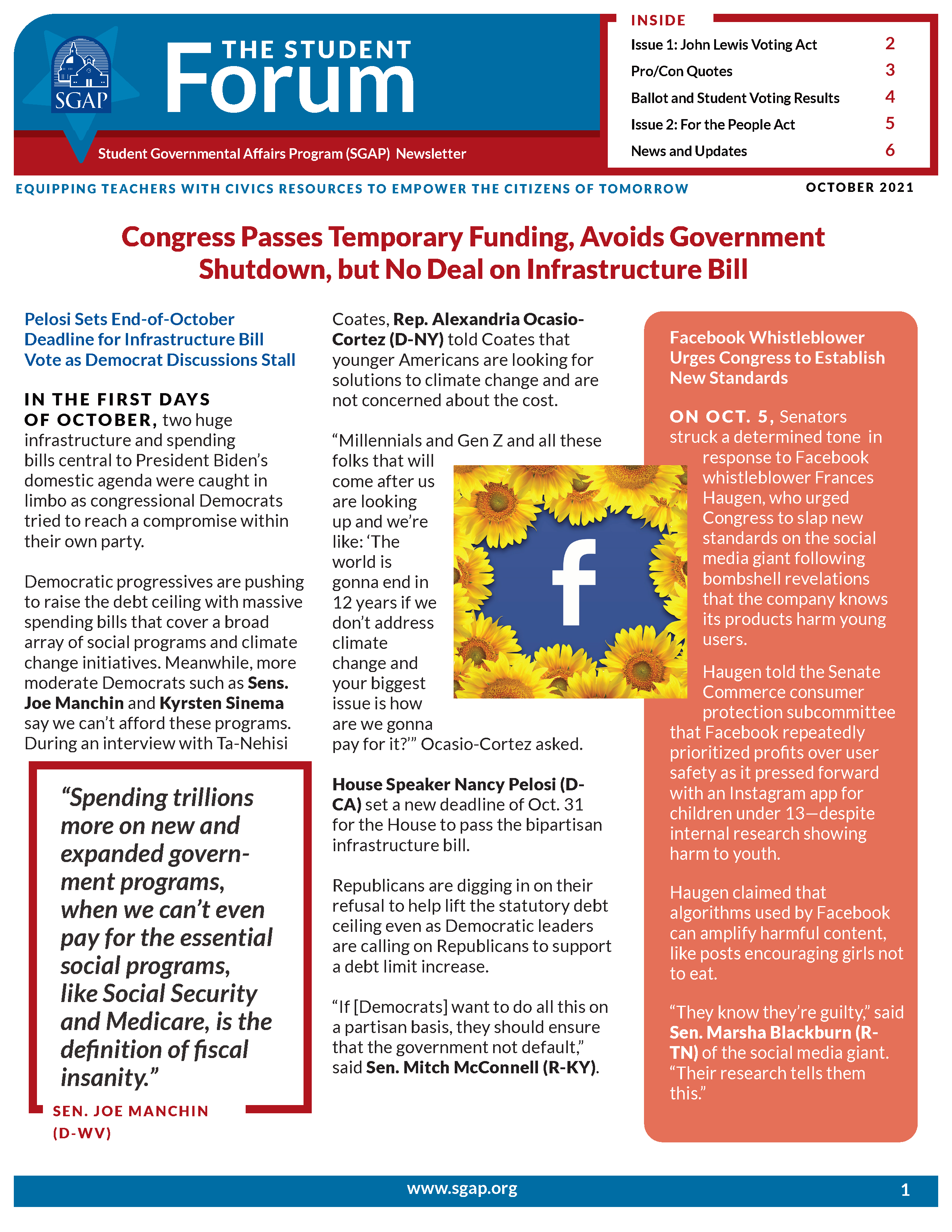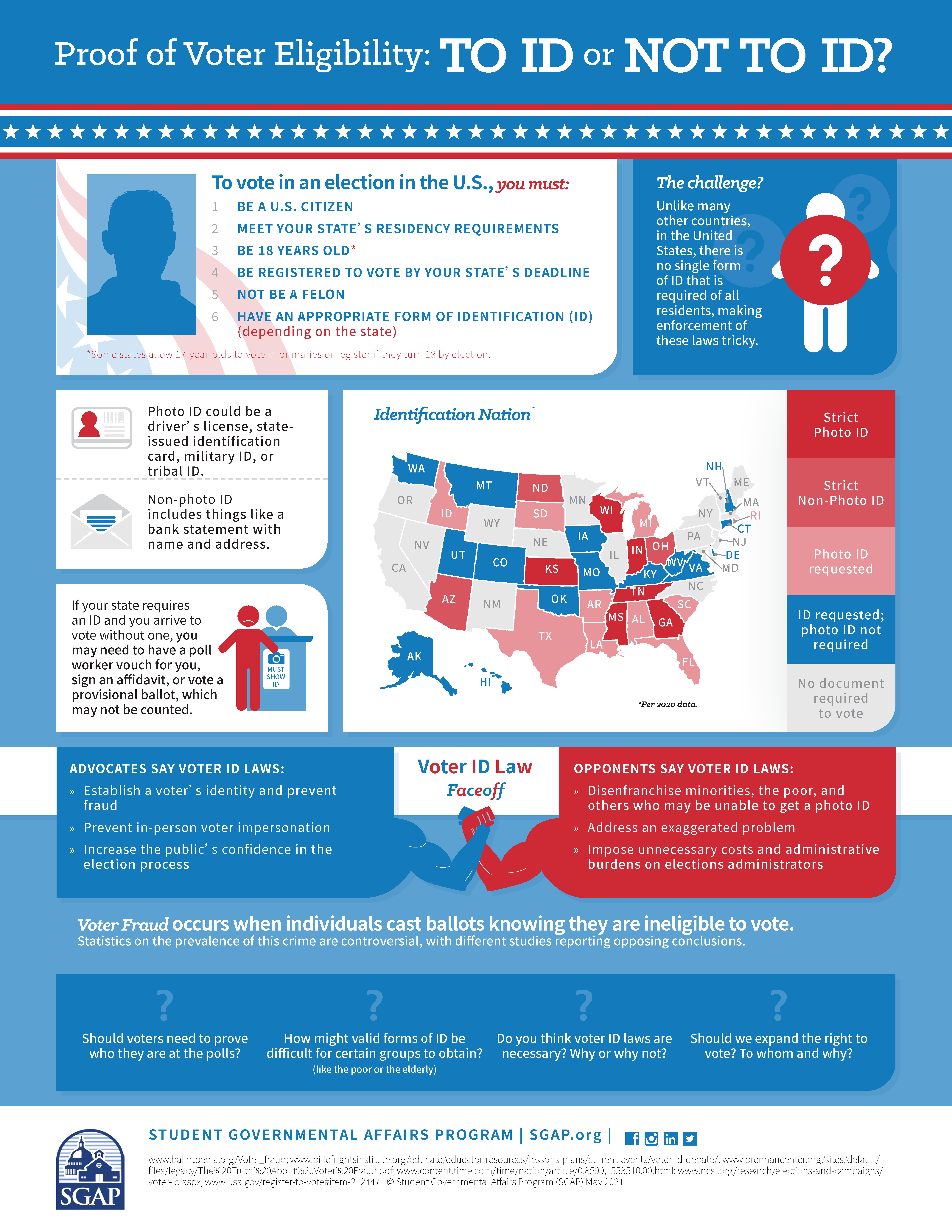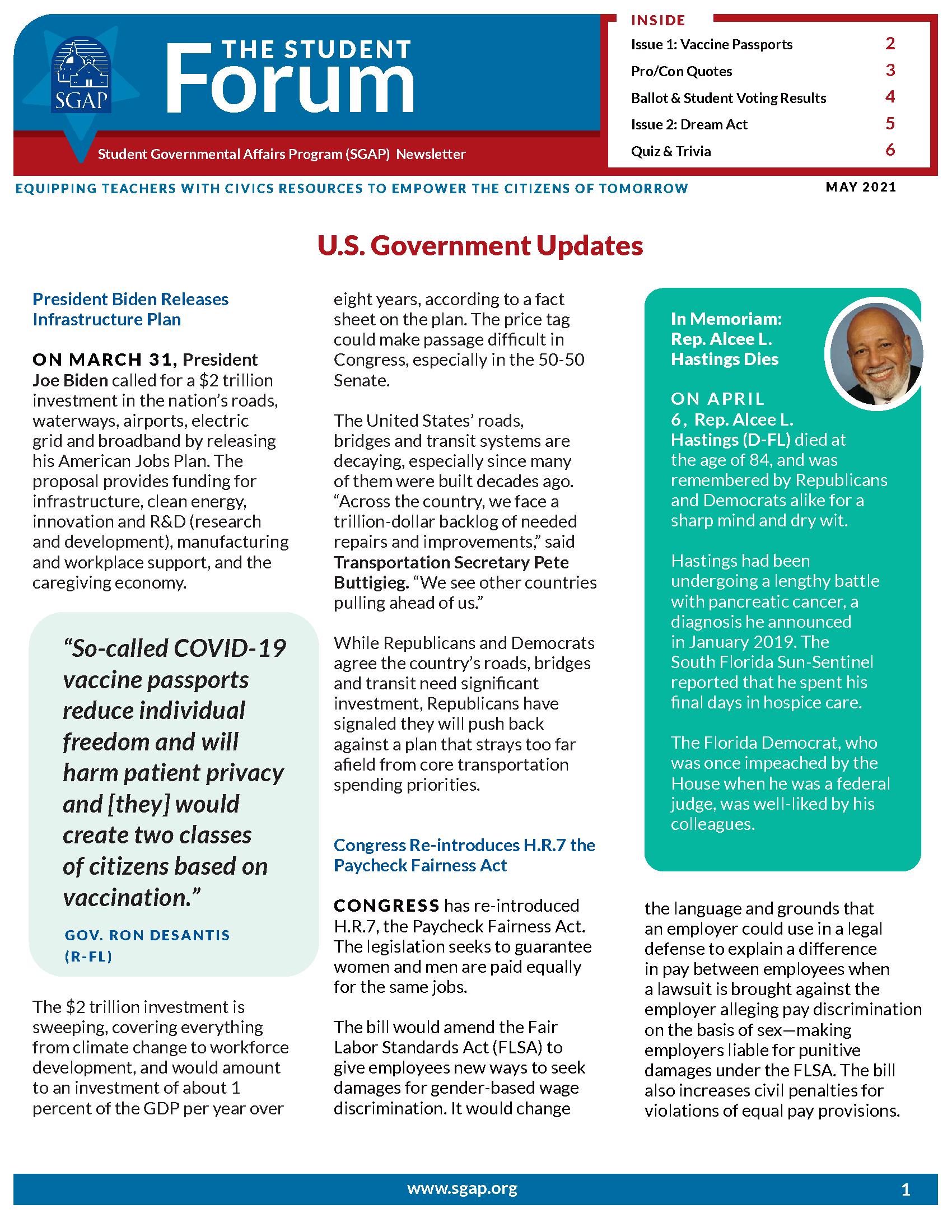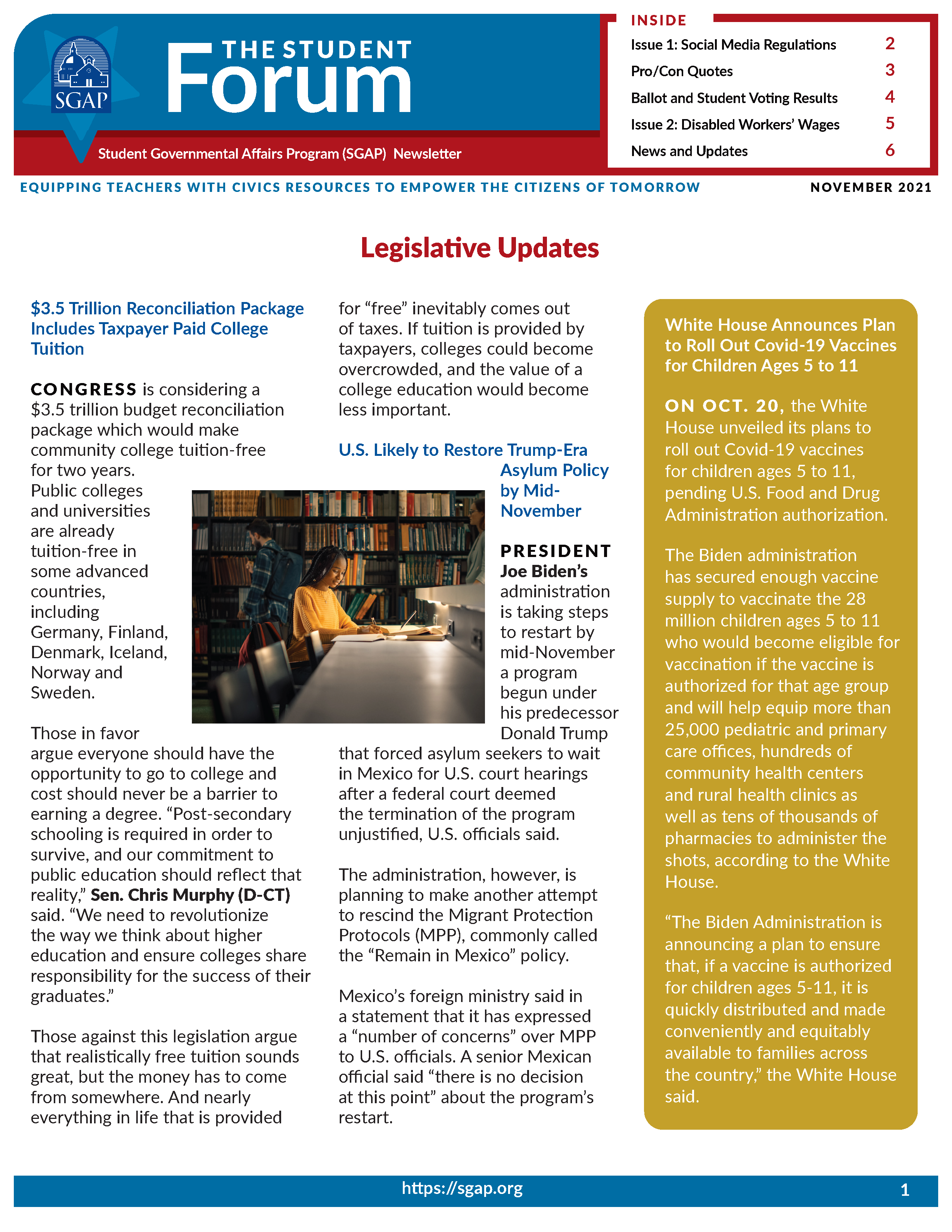
SGAP Newsletter for October 2021 (John Lewis Act and For the People Act)
Student Forum Newsletter – September 2021 (Cuba Embargo and Puerto Rico Statehood)
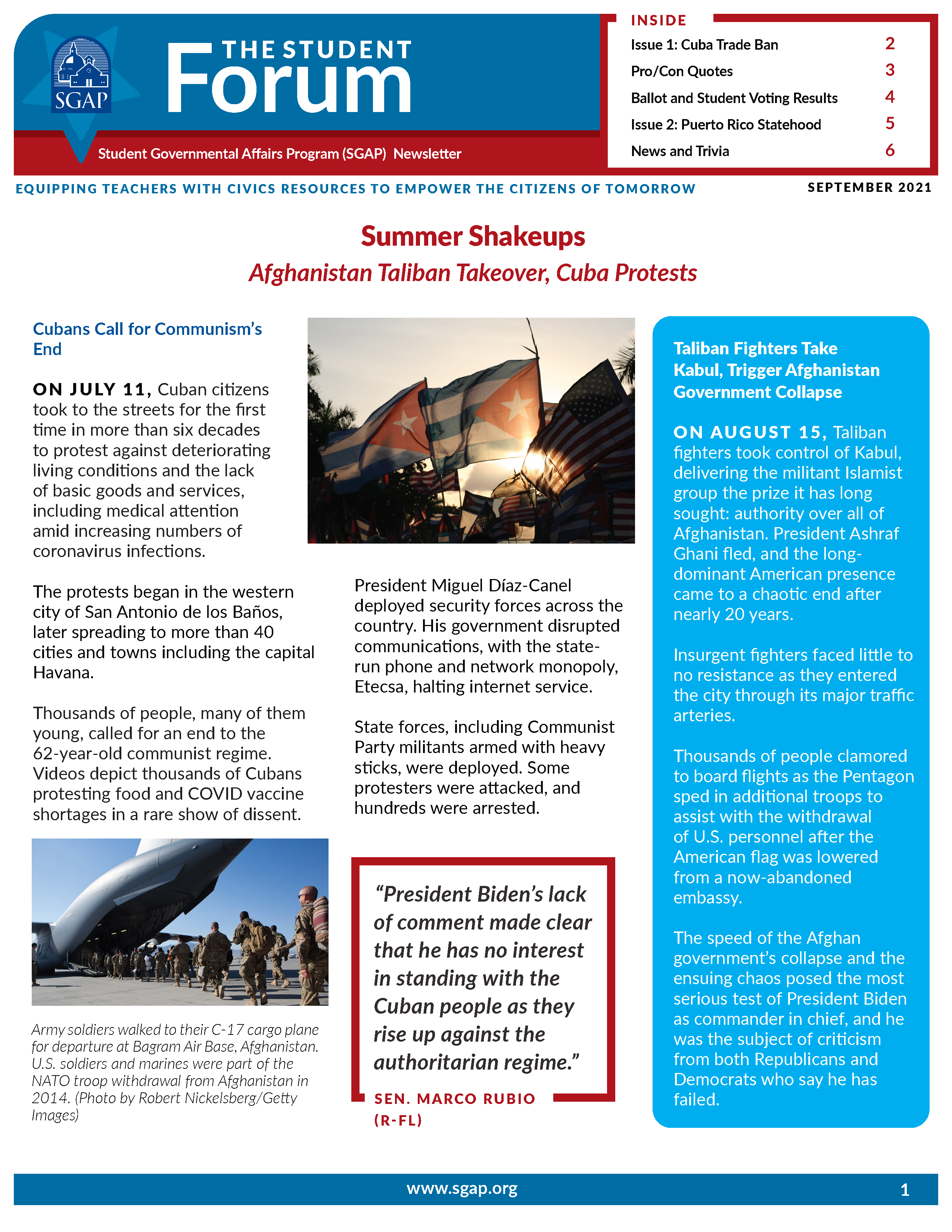
Profile of Youth Civics Activist Gabe Fleisher, Wake Up to Politics

Meet youth activist Gabe Fleisher, Editor-in-Chief of Wake Up to Politics, one of SGAP’s favorite DC-insider daily e-newsletters. The publication offers bite-size summaries plus in-depth features and insights on U.S. politics and government on Capitol Hill. Fleisher started publishing his content when he was only 7 years old.
“I got interested in politics during the 2008 elections,” Fleisher says. “I started writing a daily recap of what I was reading in the political news. That was 10 years ago. My subscriber base is more than 50,000 now.”
Nonpartisan Reporting
Fleisher is preparing for the start of his sophomore year at Georgetown University. Prior to moving to DC for college, Fleisher published his e-newsletter “from the bedroom” of his suburban neighborhood just outside of St. Louis, Missouri. For Wake Up to Politics, Fleisher has received press credentials to cover numerous political events, including presidential debates and addresses.
Fleisher says he strives to report the news in a nonpartisan way. “I try to be as objective as possible and just give people the facts,” he says. “I try to explain what’s going on simply without any beltway jargon. I also write from a different perspective because I’m young.”
Tackling Stereotypes
As a member of Generation Z—those born between 1997 and 2015 (ages 6-24 in 2021)—Fleisher is a shining example of a Gen Z influencer in political journalism and civics activism.
“It’s been a stereotype for a long time that young people are apathetic or disengaged toward politics,” he says. “That is no longer the case. Young people are emerging as a force in politics. They are influencing the conversation and making their voices heard. Young people are shifting the conversation on a lot of different issues.”
According to Fleisher, some of the issues that are most important to Gen Z include climate change, gun control and racial justice.
“Climate change is an issue that will affect my generation more than older generations,” he says. “Many young people view climate change as a much more urgent issue compared to our parents and grandparents. Racial equity and civil rights are also very important to Gen Z, which is the most diverse generation in history.”
A Decade of DC News
Recently, Wake Up to Politics celebrated its 10th anniversary. “This year, I’ve been really excited to add several new contributors to the newsletter. It’s exciting to add other young journalists to the team and keep experimenting in different ways to bring in other young voices.”
As a model of youth civic participation, Fleisher believes young people should never underestimate the say and sway of their voices. “Over the last 10 years, I’ve learned about the power of persistence,” he says. “You might be surprised by the power you have as a young person and what you can achieve.”
Note: Visit Wake Up to Politics to subscribe to Fleisher’s e-newsletter.
Proof of Voter Eligibility (Voter ID Laws) Infographic
Research Links and Discussion Questions for May 2021 Topics
RESEARCH LINKS
Issue 1: Vaccine Passports
WhiteHouse.gov: “Press Briefing by White House COVID-19 Response Team”
NPR.org: “Florida Governor DeSantis Rejects Vaccine Passports”
Bloomberg.com: “A Vaccine Passport Is the New Golden Ticket”
BuzzFeedNews.com: “You Probably Already Have a Vaccine Passport”
ABCNews.go.com: “Texas Governor Bans Mandated Vaccine Passports”
CNN.com: “What Are Vaccine Passports and How Do They Work?”
Issue 2: Dream Act
Congress.gov: H.R.6 American Dream and Promise Act
WhiteHouse.gov: “Statement by President Biden American Dream Promise Act”
The Heritage Foundation: “The American Dream and Promise Act of 2021”
ImmigrationForum.org: “Bill Summary: American Dream and Promise Act”
TheHill.com: “Tim Cook Calls on Congress to Pass American Dream Promise Act”
BusinessInsider.com: “House Passes the American Dream and Promise Act”
DISCUSSION QUESTIONS
Issue 1: Vaccine Passports
- Do you support or oppose vaccine passports? If you were speaking to a person who disagreed, what is the strongest argument in support of your position?
- Does requiring a vaccine passport represent government overreach? Why or why not?
- Privacy advocates warn that vaccine passports are intrusive. Do you agree? Why or why not?
- What civil liberties do vaccine passports potentially threaten?
- What are some of the reasons Republican governors oppose vaccine passports? Do you agree or disagree with them? Why?
Issue 2: Dream Act
- What do you think the U.S. government should do to address the legal status of undocumented immigrants who came to the United States as children?
- Who are the Dreamers? What requirements must they meet to be eligible for citizenship under the Dream Act?
- What is the most compelling argument to pass the Dream Act? What is the most convincing reason not to?
- Should the president have the power to enact a program like DACA if Congress refuses to pass the Dream Act? Why or why not?
- What solutions might students offer legislators when considering the futures of young people brought to the country as children?
Student Forum Newsletter – May 2021 (Vaccine Passports & Dream Act)
Trivia Answers for April 2021 Newsletter
D.C. Statehood Quiz
1. Which of the following people is not from D.C.?
a) James Brown
b) Duke Ellington
c) Marvin Gaye
d) Goldie Hawn
2. How does the population of Washington D.C. compare to the population of Vermont and Wyoming?
a) D.C. has almost as many people as Vermont and Wyoming.
b) D.C. has more people than Vermont and Wyoming.
c) D.C. has more people than Vermont, but less than Wyoming.
3. How would statehood for D.C. be achieved?
a) Congress would pass an admission act.
b) Congress must pass a constitutional amendment.
c) D.C. must pay Maryland 500 billion dollars for the land.
4. What is the reason for the location of our nation’s capital?
a) The North/South compromise
b) Residence Act
c) Both A and B
Research Links and Discussion Questions for April 2021 Topics
RESEARCH LINKS
Issue 1: H.R.1/Election Reform
Congress.gov: H.R.1 – “For the People Act of 2021”
Conservative Action Project: “Conservatives Oppose H.R.1, Fantasy of the Left”
Brennan Center for Justice: “Congress Must Pass the ‘For the People Act’”
Roll Call: “10 Things You Might Not Know about HR 1”
Heritage Foundation: “H.R.1 Is a Threat to American Democracy”
Fox News: “H.R.1 Imperils Free and Fair Elections, Here Are the Worst Parts”
Issue 2: D.C. Statehood
Congress.gov: H.R.51 – “Washington, D.C. Admission Act”
Cato Institute: “D.C. Statehood Is a Fool’s Errand”
League of Women Voters: “D.C. Statehood Tool Kit”
Heritage Foundation: “D.C. Statehood Bill Is Constitutionally Dubious, Flawed”
Rep. Norton: “The Fight for D.C. Statehood”
51 for 51 Website: “Issues”
DISCUSSION QUESTIONS
Issue 1: H.R.1/Election Reform
- Do you support or oppose H.R.1? If you were speaking to a person who disagreed, what is the strongest argument in support of your position?
- Does H.R.1 represent government overreach? Why or why not?
- Are the bill’s ethics provisions necessary? Why or why not?
- Are H.R.1’s improvements in access to elections, through ease of registration, early voting, and more accurate voter rolls, necessary? Why or why not?
- Do the disclosure provisions around political ads and political spending represent a threat to free speech, or a needed opening to identify who is influencing our democracy?
Issue 2: D.C. Statehood
- What are some of the reasons that Republicans oppose making D.C. a state?
- Why do you think the framers of the U.S. Constitution decided that the nation’s capital should not be located in any state?
- What rights are people in D.C. denied that other Americans enjoy?
- Why did it require a constitutional amendment to give people in D.C. the right to vote for President?
- Democrats are for D.C. statehood, but Republicans are against it. What might account for such differing views on this issue?
Student Forum Newsletter for April 2021 (H.R.1 and DC Statehood)
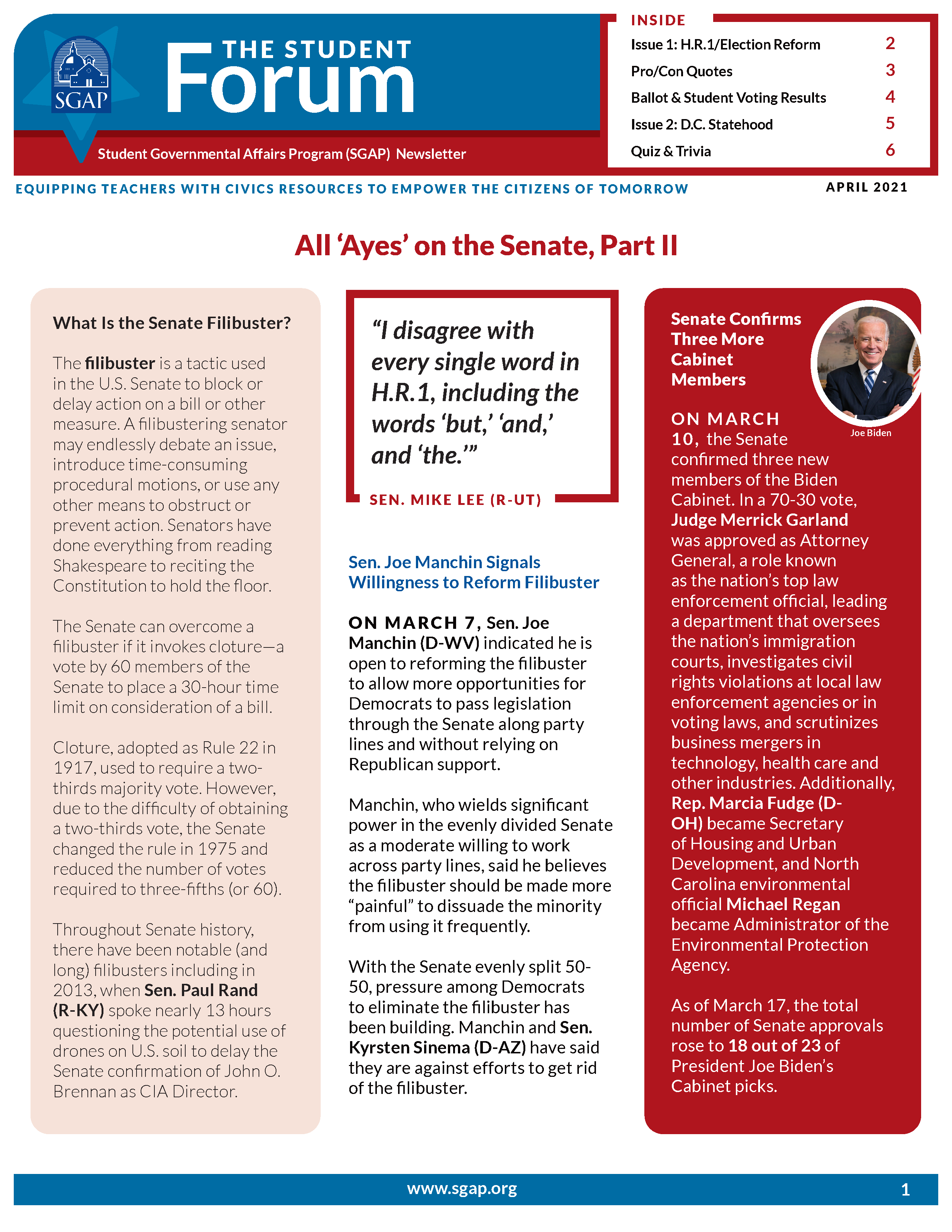
SGAP Teacher Spotlight for April 2020 (Stephen Kimbrough, Addison, Texas)
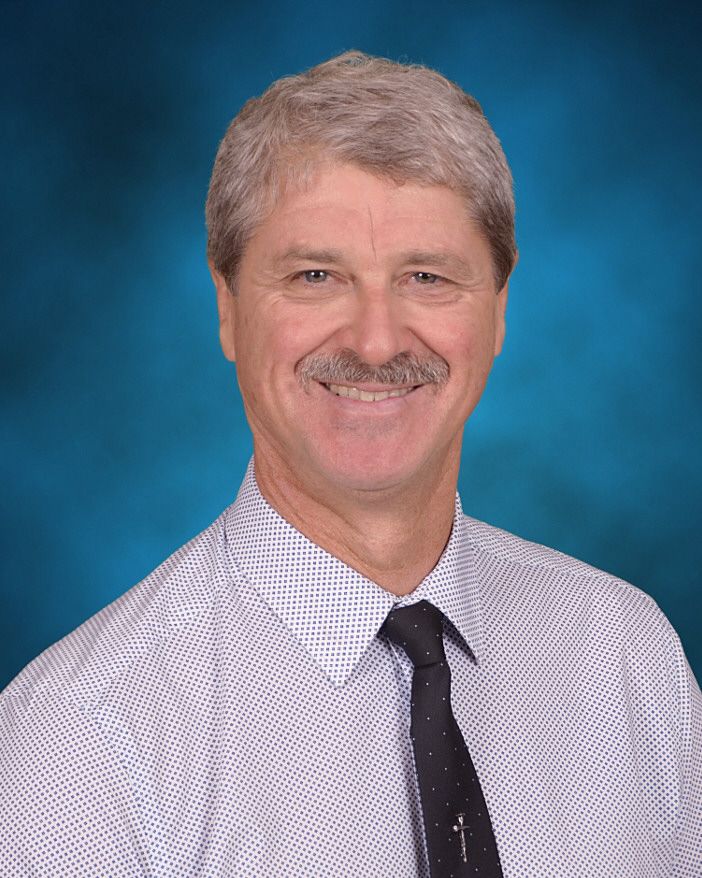
Vital Stats
Name: Stephen Kimbrough
School Name: Trinity Christian Academy
City, State: Addison, Texas
Subjects Taught: AP U.S. Government and Economics
Grade Taught: 12
No. of Years Teaching: 34
With 34 years of experience as an educator, Stephen Kimbrough teaches Advanced Placement U.S. Government and Economics to seniors at Trinity Christian Academy in the North Dallas suburb of Addison, Texas. Pedagogically, he uses the Socratic method as well as models, flow diagrams and other graphic organizers to demonstrate how various processes develop, rather than just having students memorize facts.
Kimbrough has been using the Student Governmental Affairs Program (SGAP) for about 10 years in his AP Government classroom. “I have students research the issues and write a short argumentative essay on each issue,” he says. “This is good practice for the AP Government exam, which now includes an argumentative essay.”
In his AP Government classes, Kimbrough emphasizes the importance of students becoming informed citizens as they prepare to graduate from high school and go out into the world. “I want students to have a deeper understanding of political concepts,” Kimbrough says. “When we study a specific political concept, I always challenge my students to ask the ‘why’ question.”
For instance, why did the United States Founders establish the country as a republic instead of a direct democracy? “Our Founders understood the problem of an ignorant populace, which is precisely why they created a republic,” Kimbrough says. “As our nation has become more democratic, it has become more important that we advance a more informed citizenry.”
Over time, Kimbrough says, the U.S. government has slowly changed to become more of a democracy. As a result of the Seventeenth Amendment, he points out, people now choose their senators, something the founders did not intend. Also, some people call for the removal of the Electoral College, so the people can choose the president.
But the Founders did not trust the people to make these decisions, Kimbrough says. “They knew that many of the people would not research policy questions and candidate choices, which means they could be manipulated to make decisions for selfish motives,” he adds. “My goal for my students is that they understand this and make good decisions in light of how it is supposed to work and how it works today.”
Pushing Past Partisanship
As an educator who uses SGAP in his AP Government classroom, Kimbrough believes social studies teachers must be careful not to put partisanship before teaching students to understand both sides of the issues. “I believe that if teachers can truly reveal the truth behind an issue, and not just their own ideology, that a well-informed citizenry can, and will, make the right decisions,” he adds.
The fact that today’s generation is part of one of the most informed societies in history is both a challenge and an opportunity, Kimbrough says. “Students are inundated with political information from a myriad of social media sources,” he adds. “It’s vastly important for them to be able to separate fact from fiction in order to promote a free society for generations to come.”
Kimbrough hopes that when students leave his class, they will be able to identify what the U.S. Founders intended for the American government and how that vision compares the system we have today. “Also, I desire that students remember their political participation that they completed during the course and realize that politics is not daunting, or only for people who have some type of special expertise or knowledge,” Kimbrough adds. “Everyone can get involved!”
Trivia Answers for March 2021 Newsletter
1. Who is the President of the Senate?
(U.S. Vice President)
2. Voters have elected their state senators since what year?
(1913)
3. Which senator has served longer than any other in history?
(Robert C. Byrd (D-WV)
4. Who was the only former American president to serve in the United States Senate?
(Andrew Johnson)
5. Who was the first woman to serve in the Senate and in what year?
Rebecca Felton (D-GA); 1922


